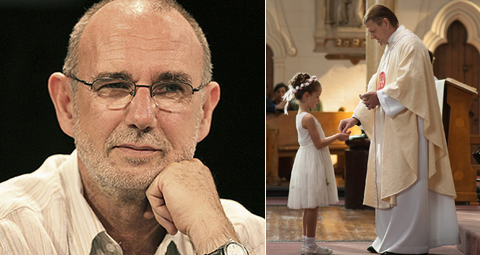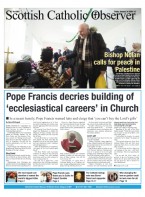June 9 | ![]() 0 COMMENTS
0 COMMENTS ![]() print
print

Journey from Brookside to Broken
Richard Purden talks to writer Jimmy McGovern about his inspiration for major new TV drama
JIMMY McGovern suggests there is one ‘surefire hit’ in every Catholic drama and that is First Holy Communion. “What other Faith gives you that?” he said. “Everyone is converging on the church for Mass and all those beautiful children are in Communion dress. We have Sean Bean as the priest giving Communion with a bit of opera in the background. You just can’t fail with a scene like that.”
Significantly the scene takes place during his new BBC series Broken and was filmed in Liverpool’s St Francis Xavier’s Church, a place that has much personal resonance for the writer.
“The church opened in 1848 and was built precisely for the Irish refugees from the Famine,” he said. “That’s where my family came from. We came to Liverpool because of that so the Irish connection is huge. It’s the church where I was Baptised and it’s where my funeral will take place.”
Significantly, Mr McGovern’s inspiration for Fr Michael Kerrigan dates back to 1982 when he first cut his teeth as a writer on Brookside and pushed for a Catholic priest to be written into the soap. Some of those ideas were featured in his feature film Priest (1994) but with an abundance of material, it’s only now that the character has been fully realised.
So what drew Mr McGovern back to the story? “It has come about because all I know in Liverpool are good priests,” he said. “I can remember when my dad died, and as you can imagine my mam was torn apart with grief and pain. There was this priest called Fitz, who we called the character in Cracker after.
“He came in and knelt down by my mam and spoke to her in the most compassionate and gentle way. He took her to a quiet corner and was just magnificent. My family, my brothers and sisters at that point really didn’t want much to do with the Catholic Church, even through we were all Catholics, but this man was magnificent. I’ve seen him and other priests work with the homeless, alcoholics and with the destitute. They are just wonderful people.
“Where I grew up is a place for the homeless and they serve breakfast to anyone who wants it. This is a Catholic initiative in the shadow of the church which we used in the series. Those homeless people would go hungry without the Catholic Church and one or two of them would die.”
While Fr Kerrigan, played by Sean Bean, is informed by clergy from Mr McGovern’s past, the storyline is very much dealing with contemporary issues and has also been inspired by priests and parishioners in the north-west of England today.
“There are parts of the Huyton area in Liverpool that are very poor,” Mr McGovern said. “I know one priest, Fr Anton, who organises his parishioners into parcelling up food and clothing for the poor people of Romania and they take it over there—there is something wonderful about that.
“The attitude is ‘OK, we’re not well off but there are people who are a lot worse off than us and let’s not lose sight of that.’ It’s a wonderful initiative.”
Thirty-five years ago, Mr McGovern got his first break writing for the Liverpool-based soap Brookside. It became one of Channel 4’s most successful programmes running for 21 years and pulling in well over nine million viewers at its peak. Faith issues proved to be a draw for viewers and Sheila Grant’s (Sue Johnston) devout Catholic outlook was often at odds with her own family and wider community.
One of Mr McGovern’s regrets about the show was that one story in particular was never broadcast.
“It was a Catholic story where Sheila Grant has a grandchild,” he said. “It was her son Damon’s child who was born after he died. Debbie (the mother) refuses to have the child Baptised so Sheila does it on her own at home and Debbie walks in and catches her. The other one was Tracy Corkhill organising a first anniversary nationwide burning of The Sun newspaper. Those two stories weren’t told and I regret that.”
As a lifelong Liverpool FC supporter, Mr McGovern had wanted to address the Hillsborough disaster in Brookside and admits he left ‘shortly after a lot of arguments at the time about it.’
He would address it on his next project, Cracker, and also on the television film, Hillsborough. The former followed a Scottish criminal psychologist played by Robbie Coltrane and was set in Manchester. One of the most controversial storylines concerned a survivor of the Hillsborough disaster Albie Kinsella who decided to ‘act like scum’ as he felt he was regarded as such.
The character was played by Robert Carlyle and one memorable scene involved the pair chanting for their respective teams.
Mr McGovern suggests he wrote Fitz as a Celtic fan to ‘demonstrate the inanity of these chants.’ He added: “You can chant Liverpool and I can chant Celtic but we’re still facing each other across this table. You’re still a totally messed up human being. I took stick for that episode but it’s everything I believe.
“Honestly, the first thing the police were given was a 45 per cent pay rise to wage war upon the trade union movement, democratically elected councillors and football fans in particular.
“The behaviour [of fans] was bad but the treatment was even worse and the treatment gave birth to the behaviour. It was ridiculous what was going on. There was contempt for white working class males who were seen as bigots, sexist pigs and homophobes and then bang— Hillsborough and that’s where that story came from.”
One of Mr McGovern’s most memorable football experiences was in the aftermath of Hillsborough on April 30, 1989, when Liverpool were invited to Parkhead to play a memorial game with Celtic.
The fans approached the ground arm in arm in an unforgettable show of support and solidarity.
“Celtic fans are the best I’ve ever come across,” Mr McGovern said. “The first game after Hillsborough was against Celtic and that match was organised by Kenny Dalglish and we’ll never forget that.
“A lot of it goes back to the Catholic thing, two west-facing ports and the 1966 European Cup Winners’ Cup ties. They [Celtic supporters] came and revealed themselves as even more mad about the game than we were when they came down and took over the city.
“They were bowing down to our buses because they were green. Within hours these great myths about Celtic fans were all over the city. I played football on Saturdays and went to Liverpool games during the week so I would’ve been in the Kop that night [in 1966]. My life has revolved around football.”
The first two episodes of Broken are available on the BBC iPlayer and the series airs Tuesdays, 9pm, on BBC One










